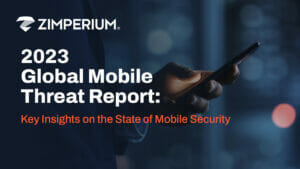
Spear phishing is a socially engineered cyber-attack specifically targeting an individual or a group of individuals. An attacker typically uses personal information about their target to make their attack seem more believable, such as sending an email that looks like it comes from one of their coworkers or friends and contains links or attachments that, once clicked upon, will install malware onto their computers or mobile devices.
Spear phishing attacks tend to be more successful than traditional phishing attacks due to being tailored more precisely toward their targets, so more are likely to fall for the scam. However, there are some common mobile device security best practices to avoid spear phishing attacks:
- Establish a secure password. A strong password is the first defense against unwarranted access and should include at least 12 characters with uppercase letters, numbers, and symbols.
- Stay current. To help protect against vulnerabilities and security threats, regularly updating your device’s OS and security patches is vital.
- Employ two-factor authentication (2FA). 2FA provides your device with extra protection by requiring secondary verification, such as code or biometric data, to gain entry.
- Always download apps from reliable sources. It is wise to only obtain apps from trusted sources like the official app stores; avoid third-party or unknown sources that may contain malware.
- Be wary when clicking links. Only click links sent by companies or organizations you know if the sender can be trusted; otherwise, hover your mouse over them to view their URL; if it doesn’t match, don’t click.
- Take precautions when opening attachments in emails or text messages from unknown senders. If in doubt, scan them first to ensure a virus-free experience.
- Use a mobile security app. A good security app will protect your device against malware and other potential threats; plenty are available, so make sure that the one you select has an excellent track record.
- Be wary of any email or text message asking for sensitive personal data such as passwords, credit card or Social Security numbers, or any other sensitive data. When in doubt about an email or text message from someone unknown, contact them directly to verify it.
- Be wary about providing too much personal data via social media platforms, as this information could be exploited by attackers for spear phishing attacks against you.
